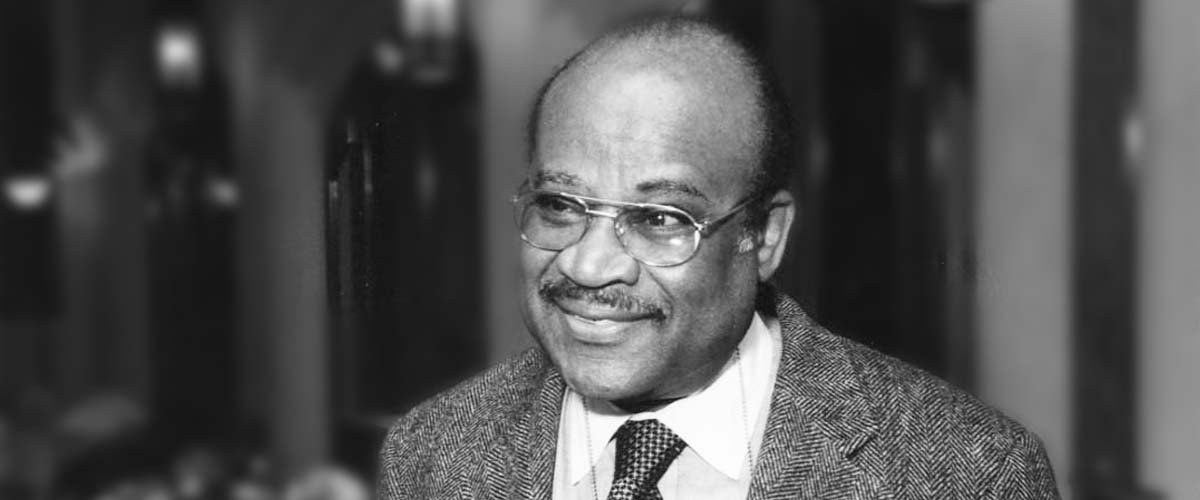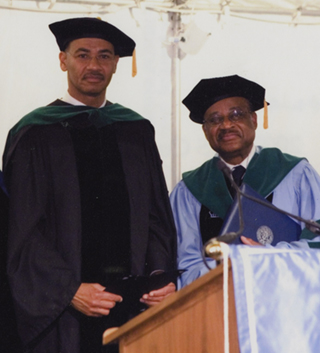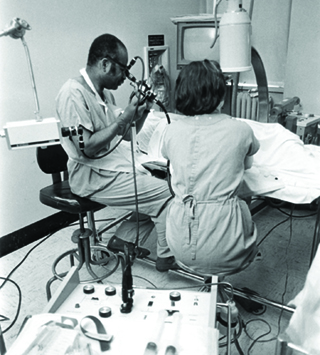It Happened Here: Dr. Kenneth A. Forde
A true trailblazer, Dr. Forde was an early advocate for colon cancer screenings and a champion for diversity.

Archives & Special Collections, Health Sciences Library, Columbia University
In 1982, Dr. Spencer E. Amory was interviewing for his residency at what is now NewYork-Presbyterian/Columbia University Irving Medical Center when he met the man who would become his lifelong mentor, Dr. Kenneth A. Forde. Once he matched at NewYork-Presbyterian/Columbia, Dr. Amory spent as much time as possible with Dr. Forde, absorbing his knowledge and techniques, emulating his compassionate interaction with patients, and observing his natural gift to lead and innovate. Today, Dr. Amory is a surgeon at NewYork-Presbyterian Allen Hospital and the Jose M. Ferrer Clinical Professor of Surgery at Columbia University Vagelos College of Physicians and Surgeons, the same professorship once held by the late Dr. Forde.

Dr. Amory (left) with Dr. Forde
“Dr. Forde was a general surgeon and then a colorectal surgeon before that became a specialty. He involved me in endoscopy and minimally invasive surgery when few in surgery understood the importance of these novel techniques. He was an early proponent of colonoscopy for colon cancer screening,” says Dr. Amory. “He had the vision of the path ahead in surgery and in colon cancer prevention and management. He also understood the importance of training surgeons with diverse backgrounds.”
A Leader in Diversity Before the Prevalence of DEI in the Workplace
A distinguished leader in surgery, medicine, and academia, Dr. Forde, who served as chief of colorectal surgery at NewYork-Presbyterian/Columbia, applied a strong but gentle approach to enacting change during his career. Even before Diversity, Equity, and Inclusion (DEI) became a recognizable term in the workplace, Dr. Forde understood from his own experience with discrimination—that diversity matters.
“In this campaign Dr. Forde was at first a foot soldier, and later a general,” says Dr. Amory. “In his early career he was the advance scout who surveyed the territory identifying obstacles and neutralizing threats. His tools in this effort were his intellect, his excellence, and his interpersonal skills. He made it possible for others like me to be welcomed. He cleared a path and subsequently strategized to recruit and retain us.”
Among the organizations that honor Dr. Forde’s service is the Kenneth A. Forde Diversity Alliance (KAFDA). Established in 2014, the group brings together underrepresented medical students, resident physicians, fellows, graduate students, faculty, research scientists, and allies across the medical center. KAFDA aims to empower the community through networking opportunities, diversity awareness, mentoring relationships, community service and leadership development opportunities.
“He was a ‘gentle giant’ who always took the high road when faced with adversity,” says Trisha Hargaden, a longtime administrative coordinator in Columbia’s Department of Surgery who assisted Dr. Forde from 1997 until his retirement in 2006.
“In the early days, he experienced a new patient walking out of his office when they realized he was the surgeon performing the procedure,” Hargaden adds. “He never became bitter as a result of the many slights he received. He focused on the bigger picture – advocating for colon cancer screening and educating people at the grass roots level as well as people in positions of power that could make a difference.”
Raising Awareness for Screenings
Dr. Forde pioneered the importance of screenings, specifically colonoscopies, for the early detection and prevention of cancer. His research expertise ranged from identifying markers for colon cancer and recognizing the involvement of polyps in cancer development. He spearheaded the use of endoscopy as a diagnostic and surgical tool.

Dr. Forde prepares for a procedure.
Courtesy of Columbia Medicine magazine
In 2000, Dr. Forde got his more than 15-minutes-of-fame when journalist Katie Couric documented and aired her first-ever colonoscopy by Dr. Forde on the Today Show. It was an up close and personal “day in the life” experience that helped raise awareness for colonoscopies as essential for early detection of colon cancer, a measure—and message—that was not yet widely known or shared.
At the end of the procedure, which Couric described as a “not-so-bad” experience, viewers got to witness Dr. Forde’s pleasant, gentle nature. The two shared a few laughs on-screen, and the segment served as one of the first widely disseminated messages around colon cancer screening and prevention awareness. More than six million television viewers tuned in, and reportedly the on-air procedure led to a nationwide increase in colonoscopies, referred to “The Katie Couric effect” in studies and throughout the media.
Paying it Forward
One could say there was also somewhat of a “Forde effect.”
“When you look at the societies that Dr. Forde was a member of or cofounded,” says Hargaden, “you can see that his very presence in these societies and the committees he served on helped broaden the inclusivity of the membership to include minorities and helped bring the colon cancer screening message to a wider audience that included minorities.”
Dr. Forde cofounded the Society of American Gastrointestinal Endoscopic Surgeons (SAGES) in 1981 and served as its president in 1983. He used the skills gained from navigating discrimination to gain acceptance for minimally invasive surgery and grow SAGES to what is now the largest surgical society in the U.S. He also was president of the New York Society for Gastrointestinal Endoscopy and New York Surgical Society, and following his retirement in 2006, became a trustee of Columbia University and NewYork-Presbyterian Hospital.
“In addition to being a visionary and an incredible mentor he also was a friend in every sense of the word,” Dr. Amory says. “For someone with his stature, he was incredibly humble. He did not dwell on his many accomplishments and was quick to recognize that his achievements were aided by the efforts of so many others.”
This story was adapted from an article that originally appeared on Columbia’s Herbert Irving Comprehensive Cancer Center news page.
